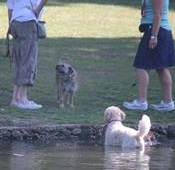Why Animals Learn
In the wild, animals learn from each other. Learning begins from interactions with the parent animals, and they also observe other members of their species and siblings in order to learn how to behave. Unlike instinctive behaviours, which involve the repetition of innate patterns of behaviour, learning involves modifying behaviours in accordance with experience.
Early research into animal learning focussed on classical conditioning, or learning by association. Later operant conditioning, or learning through actions became the area of investigation. In the latter part of the twentieth century researchers began to attribute animals with types learning which involved cognitive processes rather than just responding to the environment.
 What is the Point of Learning?
What is the Point of Learning?
When we study the mental capacity of animals, we are studying 'animal cognition'. The study of animal cognition emerged from the study of conditioning models of animal learning in psychology, and has also been influenced by research in evolutionary psychology, ethology and behavioural ecology. Research on animal cognition has mainly focussed on mammals such as primates, rodents, dogs and cats, but has also included non-mammalian vertebrates and invertebrates.
There has been much interest in the behaviour of animals for a long time. This interest has led to discussions on whether animals have a mind or not. Darwin’s research into animals and plants produced much anecdotal evidence regarding animal intelligence, but later researchers were not so satisfied with the scientific validity of his work and more scientific methods of studying animal behaviour were brought into play. Researchers such as Thorndike and Pavlov studied animals in the laboratory. Pavlov, in particular, is famous for his studies of dogs, often simply referred to as 'Pavlov’s dogs'. From these studies he developed his conditioning theory.
But what is the point of learning? Well, to exist independently, any human or non-human animal must be able to learn and have a memory. If we are not able to learn and remember new skills, events and things, then we cannot function as an independent being.
Animals can learn. A guinea pig will learn that it is about to be fed when its cage door opens. A cat learns that it is going to be fed when it hears the cat food box being opened. A dog learns that the noise of the leash or lead means it is going for a walk. These are examples of a simple form of learning - classical conditioning. In each case the animal has learnt to associate a particular stimulus with a particular outcome.
Some animals are also able to learn more complex tasks. Consider guide dogs who lead people with visual impairments through our busy and complex world. But what do we mean by learning? This is not easy to answer. Some researchers argue that it is not possible to have a single, generalised definition of learning - but a general definition is any behaviour which is modified by experience. There are many different types of learning.
See our Animal Behaviour Course -click here[08/01/2026 22:54:57]